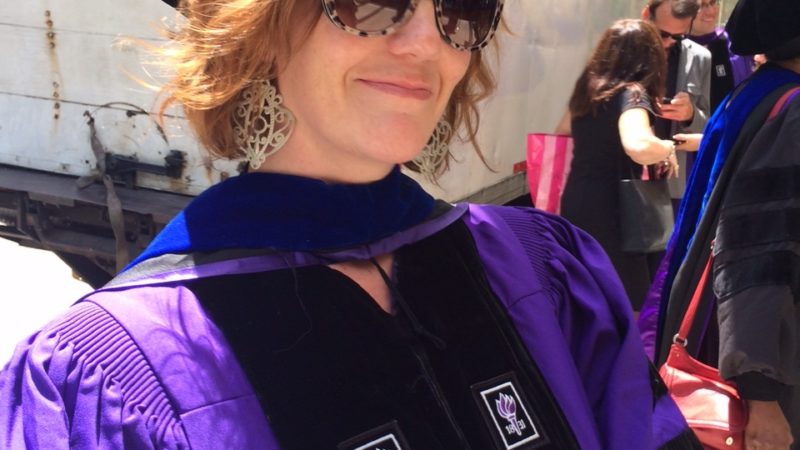Interview with Lindsay Kaplan
Waynflete student Kiera MacWhinnie ‘17 conducted an interview of Lindsay Kaplan about her decision to teach French language and literature at the high school level even after receiving her Doctorate. Waynflete Flyer journalist Gavriella King ‘15 crafted the following article from Kiera’s interview. In honor of Lindsay’s recent hooding ceremony and successful completion of her PhD in French Literature and French Studies, we are publishing the article here on USNOW.
From the first moment that I arrived at Waynflete, I immediately understood how much pride the school took both in its teachers and its teachers’ passion for their respective departments. Talk to any teacher and they will talk with you at length about their academic path and the joy they receive from teaching. It is less common, however, for a teacher at Waynflete to hold a Doctorate degree; there are three of them in total. One of these distinguished individuals arrived at Waynflete last year as a French teacher, and her name is Lindsay Kaplan.
Recently, a member of the Upper School Now activity, Kiera MacWhinnie, had the chance to sit down and interview Lindsay. After going through their conversation, it quickly became clear to me that foreign language is something that comes naturally to her (Kaplan is not only fluent in French and English, but she has also taught high school Spanish). She spoke fondly about mimicking accents as a child — it was sort of a game to her. When asked why she settled on French, she answered simply, saying “I always wanted to go to France.”
Evidently, all roads pointed towards language and the arts, which she studied at Barnard before receiving her Master’s at Columbia and her PhD at NYU. It didn’t happen so sequentially, though, and what she did in between her schooling greatly shaped her career today. After spending some time working for the Quebec government in NYC, where she promoted French artists coming to the city through parties and functions, she realized she didn’t want to carry the burden of representing the government everywhere she went. She returned to school with hopes of becoming a teacher, and when asked why she finally went back for her PhD, she humbly stated that she wanted a deeper level of knowledge and understanding. That is exactly what she got after nine years of classes, orals, prospectus defense, writing her dissertation, and then defense. Perhaps the most interesting piece about this is the topic of her dissertation, which is highly specific and pointed. In the simplest terms possible, it talks about how a group of people form a collective memory. She used the example of September 11th to provide some context. While many people do not have their own memory of the event, it has etched itself into our nation’s history. The feedback she received from those reviewing it was positive, and she could not have been more happy with the final outcome, although she was admittedly nervous going into it.
Personally, I have never demonstrated an interest in French — I took Latin all four years of high school and never looked back. But after hearing my friends describe her teaching style and her vast understanding of both the language and the culture, I found myself wishing that I could have experienced her as a teacher. The level of experience and mastery she holds in French, combined with her love of learning and willingness to teach makes her a truly unique addition to the Waynflete community, and it causes you to wonder: why does she work here?
Lindsey chose to discuss the unique relationships students are encouraged to form with teachers and nonparental adults as her favorite part of Waynflete, which I found truly remarkable. While she had great relationships with students she has taught previously, the emphasis on what that relationship should look like was different. At Waynflete, not only are those bonds encouraged, but they are integral in the learning process. It seems that while we are all blown away at Lindsay’s depth and breadth of knowledge, she is also still learning the Waynflete way and adjusting to our nonconventional methods.



